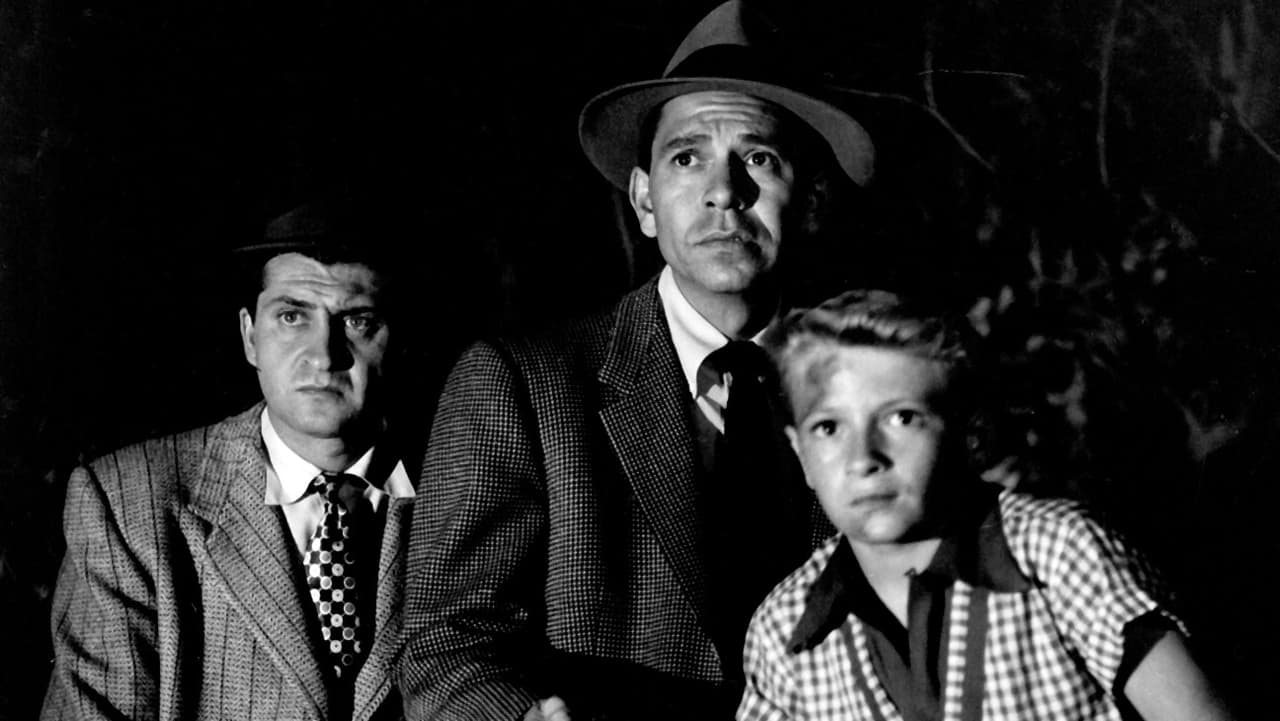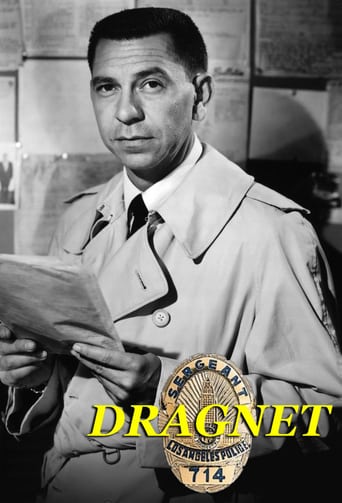Develiker
terrible... so disappointed.
Peereddi
I was totally surprised at how great this film.You could feel your paranoia rise as the film went on and as you gradually learned the details of the real situation.
Janae Milner
Easily the biggest piece of Right wing non sense propaganda I ever saw.
Staci Frederick
Blistering performances.
John T. Ryan
..........What we meant is how a Cop should carry himself! ICONIC, INSPIRATIONAL AND INTREPIDLY realistic action and dialogue, this this was a sort of "One Man Band" of Radio, TV and Movie Drama. Mr. Jack Webb created, wrote, produced, directed and starred as Sgt. Joe Friday. With all embracing credits such as those, it's a wonder that no one has ever compared him to Charlie Chaplin or even Jerry Lewis.FOLLOWING WHAT WAS a less than spectacular career in Radio Drama, Jack Webb, who had confessed to having wanted to be more like Jack Benny, came up with the brainstorm to do a Radio Dramatoic series. This would be a Police Procedural to end all Police Procedurals. Careful planning would allow the production's theme to employ only the most realistic dialogue, using the most capable actors, while they were spouting the most realistic lines in short, fast and machine gun-burst fashion.SOME HAVE SAID that this style's implementation in DRAGNET was influenced by Director Otto Preminger's LAURA.(20th Century-Fox, 1944), which starred Gene Tierney, Dana Andrews, Clifton Webb, et al. PARTICULAR ATTENTION WAS given to every detail of dress, equipment and behavioural patterns. Police manuals, training materials and even classes at the Police Academy were taken in to assure authenticity.KNOWING THAT AS in every other line of work, Cops have their own, esoteric lingo, Webb even used technical advisers and did his best to incorporate as much of this jargon as possible into each and every installment. Henceforth, the old "10 Code" would be forever a matter of public knowledge; as well as an item of "Judicial Notice." (Look it up, Schultz!) WHEREAS THE SERIES is remembered mainly for its TV incarnations, DRAGNET was born in the old days of Radio's Golden Age in 1947. By 1951, NBC was ready to test it in the unsure waters of the upstart Television. Its successes in both cases far outdistanced any expectations that were given it by the Vegas Handicappers.IF MAKING THE MOVE from Radio to the small box in the living rooms was accomplished with relative ease, certain things could not be counted on or even at all anticipated. Sgt. Friday's Detective partner on the radio was Sgt. Ben Romero, a Mexican American portrayed by Barton Yarborough. With only three teleplays in the proverbial "can", Mr. Yarborough died suddenly. His real life departure from this life was mirrored with his passing's being incorporated into the story.AFTER FRIDAY'S TEAMING up with several others (including actor Barney Phillips as Detective Jacobs), the series introduced us to Ben Alexander as Detective Frank Smith (talk about common man names!). Frank remained Friday's partner for the entire run of the original Black & White run.ONE ASPECT OF this early Television pioneering series was its musical score; well at least its opening theme and signature. Even today, over 6 decades since its introduction, "Dun-Dun-Dun-Dub" equals Police in most folks mind. Composer Walter Schumann's name may well not be a household word; but his work certainly rates that honor, nice job, Walter! JUDGING FROM THE other projects that Jack would produce*, his intent wa$ not centered on ju$t making a$ much of the buck$ as he could; but rather, an altruistic side of his intentions are revealed. When the other MARK VII Productions Title are scrutinized, one discovers a deep down admiration and affection for common men and women; who often are called upon to do very uncommon acts indeed.NOTE * In addition to DRAGNET (1951) and its revival DRAGNET 67(1967) we have such titles as ADAM 12, EMERGENCY! and O'HARE: U.S. TREASURY, which starred David Jansen.
Dalbert Pringle
Though somewhat dry and routine at times, generally speaking, Dragnet's no-frills approach to the telling of its "real-life" crime stories was actually very entertaining, for the most part.Presented in a semi-documentary style, this highly-popular TV show from the glorious 1950s featured Sargeant Joe Friday and his ever-helpful sidekick, Frank Smith, who, through intense investigation, always got their man (and sometimes got their girl).You can be sure that when Friday's on the case, justice will be served.Filmed in b&w, Dragnet's episodes were all approx. 25 minutes in length.
schappe1
Dragnet, Mulholland Falls and L.A. Confidential I've done some reading over the years about Dragnet. Jack Webb was making a movie called "He Walked by Night" in 1948 when the technical advisor, LAPD detective Marty Wynn, expressed exasperation that Hollywood never depicted police work as it actually was. the cops were always hard boiled tough guys, crooked or buffoons. Webb, after thinking about it, asked to accompany Wynn and his partner, Vance Brasher on their nightly rounds and became fascinated by police procedure and the way the real policemen talked. He suggested the radio series that became "Dragnet". The LAPD was enthusiastic because they found the way they were constantly being depicted as distasteful. Webb's police went by the book, spoke "like doctors would to patients". He also eschewed violence except in rare instances, usually showing it after it had taken place and depicting it as the human tragedy it actually was. Webb closely co-operated with the LAPD, using their files for stories and filling his shows with praise for Chief William Parker, who had been hired in 1950 to clean up and give a new image to the department. The Watts riots were the first chink in this image. Many analysts blamed them on Parker and his department, which was said to enforce racist unofficial rules about which part of town blacks could be in. In recent years, two films have been released which seem to further undercut the image of the LAPD that Webb created, Mulholland Falls, (1996) and L.A. Confidential, (1997). Mulholland Falls introduces us to the "Hat Squad", which is said to be non-fictional. Nick Nolte and his gang report directly to Chief Parker, (who is played briefly but perfectly by Bruce Dern, judging from newsreel clips I saw on his biography). He hired them to rid the city of mobsters and other criminals and to stay above politics. Nobody, but nobody is allowed to operate in L.A., not even the FBI, without going through Parker. The Hat Squad makes their own rules to do their job, including throwing a would-be mobster, (played by CSI"s William Peterson), off a cliff on Mulholland Drive they have given the title name. In L.A. Confidential, the Hat Squad and Chief Parker do not make an appearance, although I wonder if James Cromwell's Capt. Smith is somehow supposed to represent him. We are introduced here to Jack Vincennes, who is a technical advisor on a show obviously intended to represent Dragnet, the star of which is a total phony. Russell Crowe's Bud White would look good in a hat and Guy Pearce's Ed Exley seems to have watched too many episodes of Dragnet.These two films suggest that Dragnet was a phony, too, a public relations gimmick to make the seedy LAPD look good. Recent events have also not helped the image of the department, suggesting that planting evidence to help along prosecution and prejudice against African Americans is a long-standing condition. Maybe those melodramas of the 40's had it right about the LAPD. But books about Jack Webb tell about him doing such extensive research into not only the methods of the department but also the details of a cop's life. I suspect that even Chief Parker could not have protected the Hat Squad once they attacked and brutally beat up an FBI agent, as Nick Nolte does. And are we to believe that Mickey Cohen was brought to justice so the LAPD could take over his rackets? Was there ever an Alamo-like shoot out between good cops and bad cops? Was it that bad? Or is Hollywood simply reclaiming the territory won by Jack Webb in Dragnet?There are people who know. But I am not one of them.
occupant-1
I'm most familiar with the Harry Morgan period but all versions I've seen of the TV and radio originals are really good. Post-sixties angst is absent from the stories and characterizations, as in Perry Mason and perhaps a few others. Actually, "Ozzie and Harriet" from a different angle gives the same picture of a time with a bit less self-doubt.

